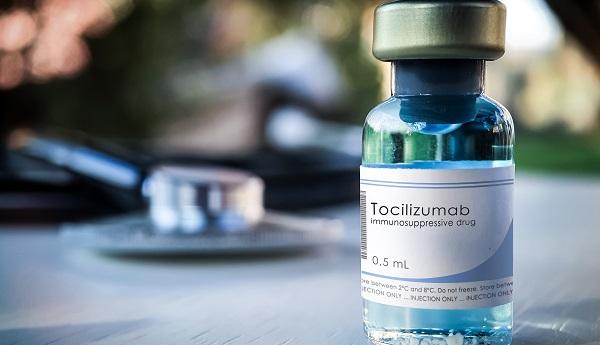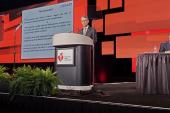Tocilizumab Improves Myocardial Salvage After STEMI: ASSAIL-MI
The anti-inflammatory appears to limit the amount of reperfusion injury after PCI, leading to higher salvage rates.

Patients with STEMI undergoing PCI who received an intravenous dose of tocilizumab, an inhibitor of the inflammatory cytokine interkleukin-6 (IL-6), prior to their procedure appeared to have less myocardium irreversibly damaged when compared with patients who received matching placebo, according to a small, proof-of-concept study.
While there was no significant difference in the final infarct size at 6 months, the adjusted myocardial salvage index, which accounts for the extent to which ischemic myocardium recovers after reperfusion—and was the trial’s primary endpoint—was significantly higher among patients treated with tocilizumab. As for the clinical significance of the improvement with the IL-6 inhibitor, lead investigator Kaspar Broch, MD, PhD (Oslo University Hospital Rikshospitalet, Norway), told TCTMD that’s yet to be shown.
“What we’re aiming for is to reduce the size of the area at risk that ends up being irreversibly damaged,” he said. “Obviously, if you have a large area at risk and you reduce that irreversible damage by a lot, you’d expect to see a benefit in terms of outcomes. But in order to see a difference in outcomes, you’d have to have rather large MIs in the first place, larger than we had in our study. Our problem was that we had patients with rather small MIs, and then you’d need to have a large number of patients to show a difference in outcomes.”
ASSAIL-MI, published today in the Journal of the American College of Cardiology, expands on some of the recent successes of different anti-inflammatory therapies in various cardiovascular disease settings. For example, the COLCOT trial showed that colchicine lowered the risk of ischemic cardiovascular events in patients who recently had an MI, while the LoDoCo2 trial showed it was effective in patients with chronic coronary disease. In CANTOS, the human monoclonal antibody canakinumab was also effective, albeit modestly so, at reducing the risk of major cardiovascular events in patients with stable coronary artery disease.
This is not the first time that tocilizumab (Actemra; Roche), a human monoclonal antibody used mainly for the treatment of rheumatoid arthritis and systemic juvenile idiopathic arthritis, and now in select COVID-19 patients, has been tested in patients with cardiovascular disease. In 2016, the same researchers conducted a small study in patients with NSTEMI and showed that tocilizumab reduced C-reactive protein (CRP) levels by 50% in the days after the intervention. To TCTMD, Broch pointed out that that first study showed tocilizumab reduced troponin T levels in the patients who underwent PCI, and said this suggested it might be effective for reducing reperfusion injury following revascularization.
To test that hypothesis, the researchers randomized patients presenting with chest pain within 6 hours of symptom onset to either 280 mg of tocilizumab administered intravenously (n = 101) or placebo (n = 99). Patients with a previous MI were excluded from the trial, as were those with cardiogenic shock, resuscitated cardiac arrest, and fibrinolytic therapy within the last 72 hours, among other criteria.
Myocardial salvage index, which is defined as the proportion of the myocardium at risk salvaged by treatment following PCI, was 69.3% in the patients treated with tocilizumab and 63.6% in those treated with placebo, a significant 5.6% absolute difference (P = 0.04). Final infarct size, defined as the percentage of the left ventricular mass, was 7.2% in the tocilizumab-treated patients compared with 9.1% in the placebo arm (P = 0.08). CRP levels were significantly lower with treatment, but there was no significant difference in troponin T values.
The researchers would like to study the drug further, specifically in an outcomes study, “but in order to do that, you’d need a very, very large grant because this drug is costly, or you’d have to have the pharmaceutical company on board,” said Broch. Another option would be a smaller trial, but one with patients with larger infarctions, such as patients with anterior-wall MIs, or patients at higher risk for reperfusion injury following PCI, he said. Broch noted that in a subgroup analysis, the benefit of tocilizumab was observed in those treated 3 hours after symptom onset but not in those treated before.
In an editorial, Paul Ridker, MD (Brigham and Women’s Hospital, Boston, MA), says ASSAIL-MI and the previous study of tocilizumab in NSTEMI patients suggest that the “second frontier” for anti-inflammatory agents might be the setting of acute coronary ischemia and reperfusion injury. “Moving anti-inflammatory interventions from stable atherosclerosis into acute ischemia is of considerable clinical relevance, although mechanisms likely differ and relate more to ischemia/reperfusion injury and the consequences of plaque rupture than to atherosclerotic progression,” he writes.
Ridker, who led CANTOS and CIRT, notes that the magnitude of effect seen with tocilizumab is small—the 5.6% difference in the myocardial salvage index falls well below the 20% that is typically used to define clinically important—but says this is an early study and hopefully further research will come. He notes that ziltivekimab (Novo Nordisk), which is a novel IL-6 ligand monoclonal antibody, was recently tested in phase II studies and that the manufacturer plans to test its effectiveness for slowing the progression of atherosclerosis.
Michael O’Riordan is the Managing Editor for TCTMD. He completed his undergraduate degrees at Queen’s University in Kingston, ON, and…
Read Full BioSources
Broch K, Anstensrud AK, Woxholt S, et al. Randomized trial of interleukin-6 receptor inhibition in patients with acute ST-segment elevation myocardial infarction. J Am Coll Cardiol. 2021;77:1845-1855.
Ridker PM. Inhibiting interleukin-6 to reduce cardiovascular event rates: a next step for atherothrombosis treatment and prevention. J Am Coll Cardiol. 2021;77:1856-1858.
Disclosures
- Broch reports no conflicts of interest.
- Ridker reports receiving investigator-initiated research grant support from Kowa, Novartis, Amarin, Pfizer, and the National Heart, Lung, and Blood Institute; and reports consulting Novartis, Janssen, Agepha, Flame, Civi Biopharma, Inflazome, Corvidia, Novo Nordisk, SOCAR, IQVIA, and AstraZeneca.





Comments